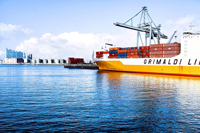 If you want to talk about a big insurance policy, let’s talk about contingent cargo insurance. Freight insurance covers product of an enormous value, and there’s a lot that can go wrong at sea. A car accident that you can walk away from is not likely to cost your insurer more than five figures. A serious problem on the open waters can lead to millions of dollars in losses. A freighter is basically a small town with an engine on it, so you need a heavy-duty policy to cover every trip.
If you want to talk about a big insurance policy, let’s talk about contingent cargo insurance. Freight insurance covers product of an enormous value, and there’s a lot that can go wrong at sea. A car accident that you can walk away from is not likely to cost your insurer more than five figures. A serious problem on the open waters can lead to millions of dollars in losses. A freighter is basically a small town with an engine on it, so you need a heavy-duty policy to cover every trip.
A contingent cargo policy is taken out by freight brokers in order to insure against any claims made by the shipper. Shippers are expected to hold the brokers accountable should there be any significant losses or damages in transit, and will only come into play should the carrier refuse to honor a claim. For instance, if the captain throws a cargo container into the sea in order to, say, pick up speed in order to escape approaching pirates, the carrier is unlikely to honor the claim made by the shipper. In this instance, contingent insurance would then pay the claimant.
Contingent motor cargo insurance isn’t exclusive to maritime transport, of course. Anyone who carries cargo may carry contingent cargo insurance. This means trucking companies, airplanes, trains, even somebody who’s pulling a big enough trailer with their car may carry a contingent cargo policy. Essentially, if you’re carrying more cargo than you cover out of pocket, then a contingency cargo policy may help to keep you in business no matter what goes wrong.
Contingent cargo coverage, of course, only covers the cargo. This type of policy will help to ensure that, should something happen to the cargo, the shipper will be reimbursed without the carrier needing to pay out-of-pocket for damages or losses due to a train accident, a ship sinking or similar disaster. The carrier, driver, captain, train conductor, the company that owns the truck or railroad or ship will still need to cover their own end on every front required within their industry. Contingent cargo plans won’t cover, say, a ship worker whose leg is injured on the trip and is entitled to worker’s compensation. Contingent cargo insurance means that, if none of the other policies that you have in place will cover your cargo losses or damages, then you still have a last line of defense to fall back on.





